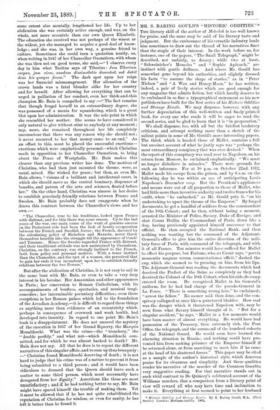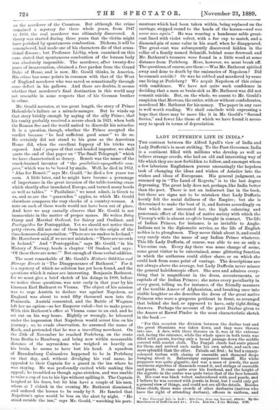MR. S. BARING GOULD'S "HISTORIC ODDITIES."* THE literary skill of
the author of Mehalah is too well known for praise, and the same may be said of his literary taste and. judgment. But the exuberance of his versatile industry leads him sometimes to draw out the thread of his narratives finer than the staple of their interest. In the work before us, for instance, one of the papers, " The Snail Telegraph," might be described, not unfairly, as dreary ; while two at least,. " Schweinicher's Memoirs " and " Sophie Apitzsch," are instinct with gentle dullness. And where Mr. Gould has somewhat gone beyond his authorities, and slightly dressed his facts " to assume the shape of stories," as in " Peter Nielsen " and " A Wax and Honey-Moon," he has written, indeed, a pair of lively stories which are good enough for any magazine that admits fiction, but which hardly deserve to be embalmed in so fine a typographical monument as his new publishers have built for the first series of his Historic Oddities and Strange Events. We may dispense, however, with any further depreciation of this well-written and finely printed book, for every one who reads it will be eager to read the second series, and be glad to learn that it is " in preparation."
We shall dispense, too, with all but the briefest laudatory criticism, and attempt nothing more than a sketch of the salient points in some of Mr. Gould's more interesting papers. The third, which is headed those of Mallet, contains a full but succinct account of what he justly says was " perhaps the most extraordinary conspiracy that was ever devised." When the report of this conspiracy was read over to Napoleon, on his return from Moscow, he exclaimed emphatically : " We must no longer disbelieve in miracles." There were grounds for such an inference. For at 10 p.m. on October 22nd, 1812, Mallet made his escape from the prison, and by 6 a.m. on the following day he was within an ace of anticipating Louis Napoleon's December coup. But the President's appliances and means were out of all proportion to those of Mallet, who had little more than inventive audacity and twelve francs for his outfit, when " he embarked," as Mr. Gould puts it, " on his undertaking to upset the throne of the Emperor." By forged documents, he got a handful of soldiers from the commandant of the 10th Cohort ; and he then, without losing a moment,. arrested the Minister of Police, Savary, Duke of Rovigo ; and shot Count Hullin, the Commandant of Paris, down like a dog, having previously appointed himself successor to that official. He then occupied the National Bank, and then nothing was wanting but the command of the Adjutant- General's office to give him the entire direction of the mili- tary force of Paris, with command of the telegraph, and with it of all France. Ten minutes would have sufficed for Mallet to effect his purpose, but Fortune, who, as Caesar says, " parvis momentis magnus rerum commutationes efficit," dashed the cup, which she seemed to be pressing on him, from his lips. The Adjutant-General was reading the documents which had deceived the Prefect of the Seine as completely as they had deceived the Colonel of the 10th Cohort, when his aide-de-camp- entered the room. He recognised Mallet in his General's uniform, for he had had charge of the pseudo-General in La Force. " There is something wrong here," he exclaimed ; " arrest the fellow." No sooner said than done, and the con- spiracy collapsed at once like a punctured bladder. How real was the danger which it threatened Napoleon with, may be seen from what Savary himself thought of it. " But for a singular accident," he says, " Mallet in a few moments would have been master of almost everything. He would have had possession of the Treasury, then extremely rich, the Post Office, the telegraph, and the command of the hundred cohorts of the National Guard. He would soon have learned the- alarming situation in Russia ; and nothing could have pre- vented him from making prisoner of the Emperor. himself if he returned alone, or from marching to meet him if he came• at the head of his shattered forces." This paper may be cited as a sample of the author's historical style, which deserves• praise for its clearness and simplicity. And these qualities. render his narrative of the murder of the Countess Goerlitz very suggestive reading. For that narrative stands out in. such vivid contrast to De Quincey's celebrated account of the Williams murders, that a comparison from a literary point of view will reward all who may have time and inclination to make it. Everything at first seemed to point to her husband • Historic Oddities and Strange Events. By S. Baring Gould, M.A., (First Series.) London : Methuen and Co. 1889.
as the murderer of the Countess. But although the crime remained a mystery for three whole years, from 1847 to 1850, the real murderer was ultimately discovered. A theory was started during those years that the victim might have perished by spontaneous combustion. Dickens, it will be remembered, had made one of his characters die of that sensa- tional disease ; but Professor Liebig, when examined on this ease, stated that spontaneous combustion of the human body was absolutely impossible. The murderer, after twenty-five years of incarceration, obtained a free pardon from the Grand Duke of Hesse, and is now, Mr. Gould thinks, in America.
His crime has some points in common with that of the West of England murderer who was saved so sensationally through some defect in his gallows. And there are doubts, it seems, whether that murderer's final destination in this world may not resemble in some respects that of his German brother in crime.
Mr. Gould narrates, at too great length, the story of Prince Hohenlohe's failure as a miracle-monger. But he winds up
that story briskly enough by saying of the silly Prince, that his vanity probably received a severe check in 1821, when both the Roman See and the world united to discredit his miracles. It is a question, though, whether the Prince accepted the verdict because " he had sufficient good sense " to do so. He certainly did not stand to his guns as the American Home did, when the excellent foppery of his tricks was exposed. And et propos of that cool-headed impostor, we shall quote the end of that paper on " The Snail Telegraph " which we have characterised as dreary. Benoit was the name of the crack-brained inventor of "the pasilalinic-sympathetic com- pass," which was to be boxed by snails. Well, he died in 1852. " Alas for Benoit !" says Mr. Gould, " he died a few years too soon. A little later, and he might have become a personage of importance in the great invasion of the table-turning craze which shortly after inundated Europe, and turned many heads as well as tables." " Pasilalinic," we must admit, is Greek to us, and so are the " quarendon " apples, to which Mr. Gould elsewhere compares the rosy cheeks of a country-woman. A note on each of these words would not have been out of place. And here we may casually observe that Mr. Gould is not immaculate in the matter of proper names. He writes Betsy Gamp and Marshal Oudenot, for Sairey and Oudinot, and Pontoppidon for Pontoppidan. Yet we should not notice these petty errors, did not one of them lead us to the origin of the time-honoured misquotation: "There are no snakes in Iceland." Dr. Horrebrow said, if we are not mistaken : " There are no owls in Iceland." And " Pontoppidon," says Mr. Gould, " in his History of Norway, heads a chapter Of Snakes,' and says : Of these there are none.'" But enough of these verbal oddities.
The most remarkable of Mr. Gould's Historic Oddities and Strange Events is " The Disappearance of Bathurst." For it is a mystery of which no solution has yet been found, and the questions which it raises are interesting. Benjamin Bathurst, for we must give a brief sketch of his doings in 1809, before we notice those questions, was sent early in that year by his kinsman Earl Bathurst to Vienna. The object of his mission was to urge Austria to declare war against Napoleon, as England was about to send fifty thousand men into the Peninsula. Austria" consented, and the Battle of Wagram left her no option—so her Emperor ruled—but to make peace. With this Bathurst's office at Vienna came to an end, and he set out on his way home. Rightly or wrongly, he laboured under the impression that Napoleon would arrest him on his journey ; so, to evade observation, he assumed the name of Koch, and pretended that he was a travelling merchant. On the 25th of November he reached Perleberg, on the route from Berlin to Hamburg, and being now within measurable -distance of the myrmidons who weighed so heavily on his brain, he seems to have lost his head. A squadron -of Brandenburg Cuirassiers happened to be in Perleberg on that day, and, without divulging his real name, he appealed to their Captain for a guard in the inn where he was staying. He was profoundly excited while making this appeal; he trembled as though ague-stricken, and was unable to raise a cup of tea to his lips without spilling it. The Captain laughed at his fears, but let him have a couple of his men, whom at 7 o'clock in the evening Mr. Bathurst dismissed, and ordered the horses to be ready by 9. He fancied that Napoleon's spies would be less on the alert by night. " He stood outside the inn," says Mr. Gould, " watching his port- manteau which had been taken within, bei g replaced on the carriage, stepped round to the heads of the horses—and was never seen again." He was wearing a handsome sable great- coat lined with violet velvet, with a fur cap to match, and a diamond-pin of some value in his scarf, when he disappeared. The great-coat was subsequently discovered hidden in the cellar of a family named Schmidt, behind some firewood, and Mr. Bathurst's trousers were found in a little wood at some distance from Perleberg. Here, however, we must break off. The questions, of course, are these :—Was Mr. Bathurst spirited away and done to death by the emissaries of Napoleon? Did he commit suicide ? Or was he robbed and murdered by some one living at Perleberg ? We acquit Napoleon of this crime with confidence. We have not quite such confidence in deciding that a man so brain-sick as Mr. Bathurst was did not commit suicide. But, on the whole, we assent to Mr. Gould's suspicion that Mertens, the ostler, with or without confederates, murdered Mr. Bathurst for his money. The paper in any case is well worth reading. We shall conclude with expressing a hope that there may be more like it in Mr. Gould's " Second Series," and fewer like those of which we have found it neces- sary to speak in terms of depreciation.







































 Previous page
Previous page